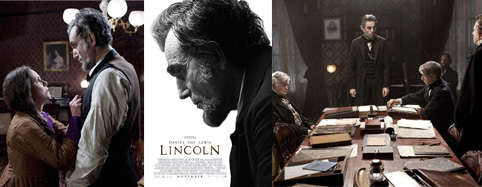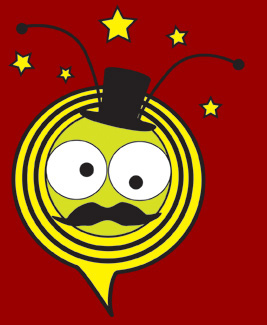
 D
DThe first hour and a half of Lincoln is dry as dirt and dull as an old penny. Once you stick that out, your reward will be an additional hour of bombastic Spielbergian sentiment, a climactic scene of old-timey gents rapping on tables and heartily crying, "hear, hear!" Complicating a few of our simplistic elementary school lessons about the unerring goodness of Honest Abe, Lincoln tells a truer tale of the corruption and back alley dealings too often required to effect any positive change within the government.
Featuring perhaps the strongest cast of any of the big Oscar contenders this year, there are 4 performances that particularly greatly impressed me. I've stopped being surprised by Daniel Day-Lewis's ability to immerse himself in a role, but this may be one of the most complete transformations he's ever made. Unlike some of his other performances, this one was mercifully lacking in I Drink Your Milkshake moments and for that alone, he deserves accolades. James Spader is a delight, coming across as the only actor who seems aware of how desperately some life needs to be breathed into this film and doing an admirable job of providing some sincere comic relief. And his character's name is Bilbo! Tommy Lee Jones's smart and understated portrayal of Thaddeus Stevens (I guess I missed that day in history class) was the heart of the film for me. He effortlessly exudes exhaustion at the steady parade of buffoons in his presence. His Supporting Actor nomination is well deserved, but if I had been asked to nominate one performance from Lincoln for that category, I would instead have put my support behind the piece of wood and ivory playing Thaddeus Stevens's Walking Cane. With the slightest swivel of its head, it was able to convey worlds of emotion and meaning. Hear, hear, Walking Cane! Hear, hear.
7/10 Z
ZAmendment. (new inflection) Amendment amendment. (Thoughtful) Amendment? (Angry) AMENDMENT! (calmly, patiently) A. mend. ment. And friends, that's the plot of Lincoln, the latest masterpiece from Steven Spielberg.
I erroneously assumed that Lincoln would be about the life of Abraham Lincoln, our country's tallest president. Instead, the 2 hours and 50 minutes devoted to the telling of the story of Lincoln are actually devoted to the telling of the story of the 13th Amendment. Schoolhouse Rock probably already did this, so there's that. The 13th Amendment gets passed, which isn't a spoiler, because now we have machines to plow fields and nannies to raise our babies, not slaves. Abraham Lincoln then gets shot while he's having an evening out at the theater, which isn't a spoiler, because he is on a coin.
Daniel Day-Lewis, who is cast as our country's 16th president, plays both being tall and the world's most perfect human being ever quite convincingly, which probably wasn't that hard, considering he is both tall and the world's most perfect human being ever. Sally Field, who plays our country's 16th president's wife, plays both being dowdy and bat-shit crazy quite convincingly, which probably wasn't that hard, considering she is a good actress.
This film wasn't made for me, and there's probably very little that could have been done to make me like it, save having Wes Anderson direct it and Luke Wilson star in it. I'm not a history nut, I'm not a post-1980s Steven Spielberg nut, and I find most historical dramas about as easy to follow as a broken compass. Tony Kushner's beautiful script could easily be mistaken as the instructions for a waffle iron. There's little else for me to say on the matter. If you are a history buff or subscribe to the idea that Daniel Day-Lewis is the best actor alive today (I disagree) or really wanna learn how to make wafflesÉ enjoy.
5/10 B
BLincoln is a realistic yet poetic view of the final four months of Abraham Lincoln's life and the events that lead up to the passing of the 13th Amendment of the U.S. constitution. Director Steven Spielberg shows unexpected restraint in this film. He doesn't rely on battles or epic scenes to tell the story, and he keeps from being overly cheesy (apart from the opening scene which features an African American soldier walking coolly away from Lincoln perfectly reciting the Gettysburg Address, and the climactic scene of the casting of votes which feels like a forced attempt at suspense in a borderline cliché crescendo resembling a slow clap). Instead, the movie gets at some of the more gritty, sometimes sloppy, always human aspects of Lincoln's final days. This is a piece that feels both extremely important and entertaining, but that often loses pace partially resulting from long wordy scenes that can be difficult to follow due to its beautifully sophisticated yet antiquated language. Fortunately, Lincoln's long speeches and recounts are broken up with more humorous scenes of governmental fops trying to get votes and dramatic scenes involving Lincoln's home life. We ultimately get a Shakespearian style drama.
Beautiful cinematography, sets, and lighting add to the lushness and poetry of this film and pair magnificently with John Williams's sometimes patriotic, but often complexly lyrical score. All of the performances are outstanding, but Sally Field has a particularly amazing brace of juxtaposed scenes where she goes from a desperately heartbroken and scared mother to a marvelously fiendish diva. She shows us that she has still got it, and she reminds us that we like her, we really like her.
7/10
